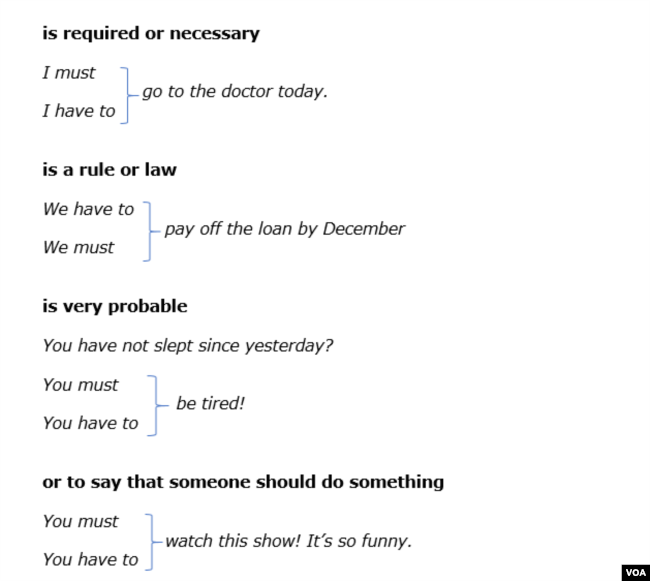Today we will answer a question about two misunderstood modal verbs.
Modal verbs are helping verbs. They help us express things like necessity, permission, ability and possibility. For example, “I can bring the bag tomorrow” uses the modal verb “can” to express ability.
Now, here is our question:
Question:
Hi! Can you tell me the difference between “must” and “have to”? - Manuel
Answer:
Hello, Manuel. Thanks for writing!
The modal verbs “must” and “have to” are very close in meaning. They both express a requirement or need to do something.
First, let me tell you what grammar books say about these verbs. Then, I will tell you how we really use them.
Grammar books say that:
“Must” expresses that the speaker has decided that something is a requirement or necessity.
And “have to” expresses that someone else has made something a requirement or necessity. An example would be a rule or law.
But, in the real world, we do not often separate the meanings this way. We use both modals to express that something...
However, when speaking American English, we usually only use “must” to say that something is very likely. For all other meanings, it usually sounds too formal or official.
And, Americans rarely use “must” in questions, except when criticizing someone:
Must you chew so loud?
Negative forms
And, here is something to watch for:
The negative forms of “must” and “have to” have completely different meanings.
We use the negative of “have to” when something is not required or necessary:
You don’t have to wash the dishes. I'll wash them!
But “must not” or “mustn’t” means that something is banned or not permitted.
And that’s Ask a Teacher.
To ask another question, simply go to our website: learningenglish.voanews.com.
To ask another question, simply go to our website: learningenglish.voanews.com.
I’m Alice Bryant.
Text Source: Bryant, Alice. “Ask a Teacher: Must and Have To.” VOA, 7 Dec. 2018, learningenglish.voanews.com/a/ask-a-teacher-must-and-have-to/4686883.html. Accessed 15 Feb. 2020.
Lessons and exercises:
- BBC Learning English:
- Must vs Have to - English In A Minute
- Mustn't vs Don't have to - English In A Minute
- 'Have To' and 'must' - 6 Minute Grammar
- Modal Verbs: Have to and Must: The Grammar Gameshow Episode 5
- must / have to / have got to
- Perfect English Grammar: Modal Verbs of Obligation
- Cambridge Dictionary:
- Oxford University Press:

Comments
Post a Comment